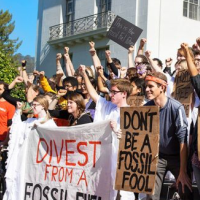Environmentalists Rejoice as UC Sells Off 2% of Its Fossil Fuel Investments
 Fossil Free protest at UC Berkeley in October 2013, (photo: Arya Aliabadi)
Fossil Free protest at UC Berkeley in October 2013, (photo: Arya Aliabadi)
Down goes coal. Down goes coal. Supporters of the fossil fuel divestment movement received good news last week when the University of California announced it was selling $200 million worth of coal and tar sands investments.
That leaves about 10% of the university’s $98.2 billion worth of investments in other forms of non-sustainable energy, like oil and natural gas, according to the Los Angeles Times.
Mother Jones said “environmentalists are celebrating.” Jake Soiffer, a junior and representative of Fossil Free UC, told the UC Berkeley Daily Californian that the decision to sell holdings was a “powerful victory” for the campaign.
But coal and tar sands stocks were an easy sell for UC. They have been big money losers all year. Chief Investment Officer Jagdeep Bachher told Reuters that slowing demand for dirty coal and even dirtier tar sands, and growing hostility from regulators dims the prospects for improvement. So he bailed.
Coal production in the United States has dropped pretty steadily for the past 15 years, and the number of coal mines operating equals the late eighteenth century. Production worldwide declined 0.7% in 2014, but consumption grew by 0.4%. According to the World Coal Association, “Coal provides around 30.1% of global primary energy needs, generates over 40% of the world's electricity and is used in the production of 70% of the world's steel.”
The financial impact on the university or the coal and tar sands industries is negligible. According to a 2013 report (pdf) on global divestiture by Oxford’s Smith School of Enterprise and Environment, “Direct impacts of fossil fuel divestment on equity or debt are likely to be limited,” although the crippled coal industry is more vulnerable than oil and gas.
The real value in almost all divestment at this fairly early stage of the movement is in “stigmatization.” If an industry looks weak, the public will have a more jaundiced view of it, regulators will be emboldened and investors will be more wary. It’s a strategy used to battle munitions manufacturers, the tobacco industry and apartheid in South Africa.
So there is value in the pronouncement by UC spokesperson Dianne Klein that the decision is influenced by, “environmental sustainability, social responsibility and prudent governance risks.” That last one may be a reference to UC having one of the worst returns on investments among the nation’s wealthiest schools between 2004 and 2013.
Fossil fuel divestiture first got going in 2011 and, according to Arabella Advisors, grew to include 181 institutions and local governments (pdf) by September 2014, an increase of 107 since January of that year. They calculated divestiture pledges at $50 billion. Fossil fuel companies have an estimated market capitalization of $4 trillion.
The tobacco divestiture, ongoing since the 1980’s, has led to $5 billion in outflow in a $500-billion industry where there are no shortage of investors to pick up the slack, and in a world with no shortage of smokers.
State lawmakers voted 10 days ago to restrict California’s giant pension funds—California Public Employees’ Retirement System (CalPERS) and California State Teachers’ Retirement System (CalSTRS)—from making new investments or renewing existing investments in companies that use coal to generate electricity. Senate Bill 185 is expected to be signed by Governor Brown.
–Ken Broder
To Learn More:
UC Sells About $200 Million in Direct Holdings in Coal, Oil Sands Companies (by Suhauna Hussain, UC Berkeley Daily Californian)
The University of California Just Sold off $200 Million in Fossil Fuel Investments (by Gabrielle Canon, Mother Jones)
UC Sells Off $200 Million in Coal and Oil Sands Investments (by Larry Gordon, Los Angeles Times)
University of California Sells $200 MLN Holdings in Coal, Oil Sands Firms (by Rory Carroll, Reuters)
The Real Impact of Universities Divesting from Fossil Fuels (by Lydia O’Connor, Huffington Post)
State’s Giant Pension Funds Lost $5.2 Billion in Fossil Fuel Investments (by Ken Broder, AllGov California)
More Light than Heat? Stanford Dumping Coal Stocks from $18.7 Billion Endowment (by Ken Broder, AllGov California)
Measuring the Global Fossil Fuel Divestment Movement (Arabella Advisors) (pdf)
Stranded Assets (by Atif Ansar, Ben Caldecott and James Tilbury, Smith School of Enterprise and Environment) (pdf)
- Top Stories
- Controversies
- Where is the Money Going?
- California and the Nation
- Appointments and Resignations
- Unusual News
- Latest News
- California Forbids U.S. Immigration Agents from Pretending to be Police
- California Lawmakers Urged to Strip “Self-Dealing” Tax Board of Its Duties
- Big Oil’s Grip on California
- Santa Cruz Police See Homeland Security Betrayal in Use of Gang Roundup as Cover for Immigration Raid
- Oil Companies Face Deadline to Stop Polluting California Groundwater





